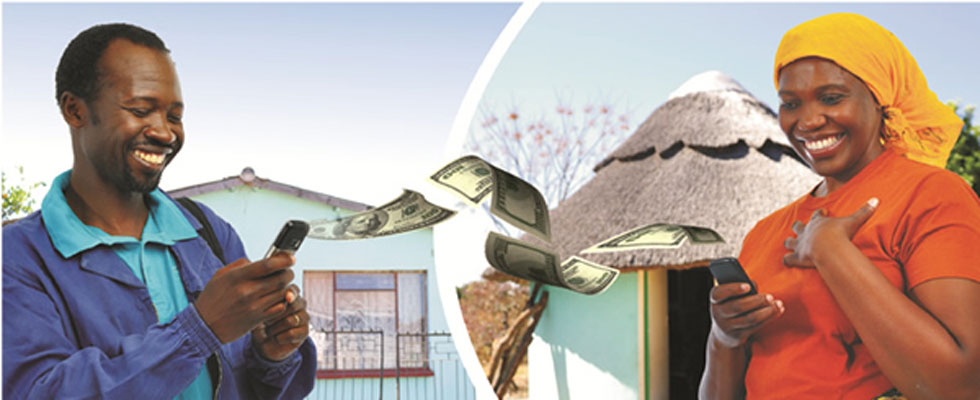
AN inevitable war is simmering between Econet Wireless and some banks regarding Ecocash’s domination of the financial payment system.
Report by Lance Mambondiani
The revolutionary mobile phone wallet launched in 2011 is changing the way customers view banking. Ecocash has dispensed the need for a physical interaction with a bank for basic services, threatening the survival of the entire sector.
With more than 1,7 million users, moving approximately $100 million monthly through its accredited agents, Ecocash – already the largest payment platform – is predicted to become the country’s biggest bank.
Some banks have been unhappy with the mobile network operator’s (MNO) unregulated dominance.
The mobile wallet revolution
In developing countries with a low banking and high mobile phone penetration, mobile wallets have clear benefits.
They can bring basic payment services to the unbanked increasing bank deepening and economic activity particularly in the rural areas.
- Chamisa under fire over US$120K donation
- Mavhunga puts DeMbare into Chibuku quarterfinals
- Pension funds bet on Cabora Bassa oilfields
- Councils defy govt fire tender directive
Keep Reading
Ecocash is believed to have invested $50 million into its product, employing 5 000 people and transforming the lives of ordinary people and small businesses.
In Kenya, M-Pesa (launched by Safaricom in 2007) has over
30 000 agents, 14 million users moving an estimated $1 billion transfers monthly or 70% of all transfers in the Kenyan market.
Another successful example is SMART Money in the Philippines (launched by SMART in 2 000), with over nine million wallets, connected to 9 000 ATMs, over 4 000 cash-in/cash-out centres, 15 partner banks and 95 000 agents.
People can survive without bank accounts?
The unfolding reality worldwide, particularly in developing countries, is that mobile phones and the Internet are causing a significant shift in bank practices and their distribution models.
Banks have to wake up to the fact that the phone will become the day-to-day bank account of the near future.
The average banker may dismiss this as immaterial, but the bank account worldwide is slowly unhinging from the traditional “brick and mortar” banking model which spells a massive “disruption” of the Zimbabwean financial sector. Banking is no longer somewhere you go, it’s something you do.
The success of mobile wallets such as Ecocash and M-Pesa is an inevitable shift which seems to prove, or at the very least suggest that people need banking, but they don’t necessarily need banks. The best way to deliver banking products may not necessarily be in the branch, but wherever and whenever a customer needs to pay for a kombi, pay their Zesa bill or send money to their parents in Mutorashanga. Customers can do this without opening a bank account or suffer extortionate bank charges.
The reliance by banks on a branch as distributional mechanisms to deliver utility values means retail banking is slowly becoming inadequate to deliver products to the customer.
Is it possible for banks to compete?
Customers prefer Ecocash because it’s cheaper, faster and has no long-term commitment. It is entirely incredulous to suggest that banks, already suffering the burden of $100 million capital requirements, can spare some cash to compete with the country’s largest MNO throwing its money into the e-payment platform.
Without a doubt, charges levied by Zimbabwean banks are exorbitant.
They may, however, reflect inefficiencies in the entire economy and in turn a fatally unprofitable banking sector. The supposition that banks charge exorbitant fees to shore up their capital could be less cogent and perhaps dishonest.
To regulate or not to regulate
While the attempt by banks to fight competition and innovation is inevitably folly, whether or not the mobile money platform should be regulated and if so how, will remain a very relevant and legitimate question.
The contestations between Econet and the banking sector will need to be addressed and the regulatory environment may need further clarity not least to protect the consumer.
Different countries have adopted different approaches, in the Philippines, MNOs can perform banking functions, while in South Africa, the process is entirely bank-led except for agents. In the US, MNOs are required to register as money service businesses, while in countries such as Japan, MNOs are required to deposit money in a bank account.
Whatever the outcome, the appropriate approach will need to balance advancing financial inclusion for the unbanked with ensuring stability and soundness of the country’s financial system.
Lance Mambondiani is a Development Economist and a Zimbabwean Banking Expert.
He is a Guest Lecturer in International Finance & Development at a UK University. Contact email [email protected] .
Twitter @DrMambondiani











